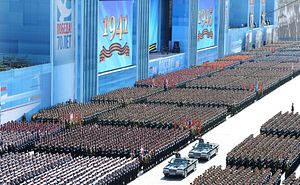Indian leaders have a diplomatic call to make as they weigh an outstanding invitation from China to send a high-level delegation and a contingent of soldiers to march in a historic military parade in Beijing on September 3, marking 70 years since the formal surrender of Imperial Japan and the end of the Second World War in Asia, or, as the Chinese call it, the “War of Resistance Against Japanese Aggression.” The Indian government, led by Prime Minister Narendra Modi, has to consider whether it should meet China’s expectation, thereby possibly upsetting Japan, a close partner, or to spurn the invitation and thereby risk poor optics with Beijing.
The decision highlights how India’s standing in the region isn’t insulated from the historical tensions that have come to permeate Northeast Asian diplomacy so visibly this year. New Delhi’s calculus is considerably complicated by the fact that the so-called “Abe Statement,” the Japanese prime minister’s widely anticipated statement of contrition for Imperial Japanese atrocities on this anniversary, remains indeterminate. The significance of Indian participation or non-participation in the Beijing parade will largely be influenced by the outcome of the Abe statement.
Observers expect that should Abe’s statement omit language on Japanese “aggression” during the war and fail to adequately express “deep remorse and heartfelt apology,” as per the benchmark 1995 statement by Japan’s then-prime minister, Tomiichi Murayama, and the 2005 statement by Prime Minister Junichiro Koizumi, Beijing will react negatively. In the case that Beijing finds the Abe statement unsatisfactory and India sends inadequate representation for the September 3 parade, perceptions of a India-Japan alliance are bound to intensify in China. After their declaration of a strategic partnership in 2006, a security partnership in 2008, and a trade liberalization agreement in 2011, India and Japan have continued to strategically converge amid mutual perceptions of a growing Chinese threat to the status quo in Asia.
If India meets Chinese expectations and sends its president, accompanied by “a military contingent of 75 troops,” the Abe administration may react negatively. Tokyo largely sees the September 3 parade as a brazen attempt by the Chinese leadership to emphasize Japan’s militaristic past. Amid recent changes to Japan’s defense posture, including the lifting of a decades-old self-imposed ban on weapons exports and a resolution reinterpreting the country’s constitutional ban on collective self-defense, China sees a newly militaristic and threatening Japan off its eastern coast. For Abe, the reforms are a bid to move toward normalization and recalibrate Japan’s post-war defense position to one of “proactive pacifism.”
India has a few ways to weigh its decision. It could wait to see whether the United States, Japan’s treaty ally and major security partner, sends any senior representation. As one Chinese scholar, Jia Qingguo, told the Global Times, a nationalistic, state-owned newspaper, “Whether the US will dispatch an envoy to attend the parade and the rank of this envoy will reflect to what degree the US sees the event as a political gesture from China to deter Japan.” Per reports, only Russia, Mongolia, Egypt, and the Czech Republic are confirmed to be sending top-level representation. If the event fails to gather momentum, New Delhi may be able to get away with sending Hamid Ansari, the vice president. In fact, this choice would probably be the safest, not alienating China but also showing Tokyo that it won’t treat this event in the same way that it has treated other war commemorative events this year.
Notably, New Delhi sent high-level representation to Vladimir Putin’s celebration of the 70th anniversary of the end of the Second World War on the eastern front in Europe. Indian President Pranab Mukherjee visited Moscow in May, overseeing a Russian parade. India’s participation in that event drew little controversy given the historically close relations between Moscow and New Delhi. Sending the Indian president to Beijing would send the most positive message to Beijing, but could draw a negative reaction from Tokyo.
As far as the issue of sending troops to march in China’s parade goes, if New Delhi wants to ensure parity between what it gave Putin and what it’ll give Chinese President Xi Jinping, it should consider sending some representation. India did send a 70-member marching contingent for the Russian commemorative event in May. We’ll know what India’s decision will be in the coming weeks, but what’s clear is that this is a highly sensitive diplomatic call for the Modi government.

































